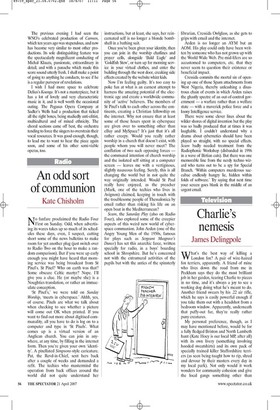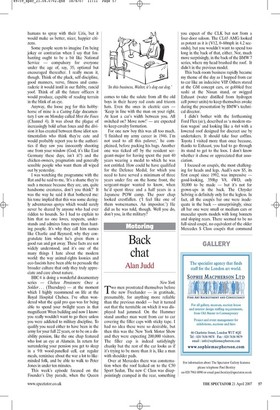Charlie’s nemesis
James Delingpole
What’s the best way of killing a London fox? A pair of wire-haired fox terriers, apparently. A friend of mine who lives down the road from me in Peckham says they do the most brilliant job in her garden, tearing Charlie to pieces in no time, and it’s always a joy to see a working dog doing what he’s meant to do. Another friend swears by his .22 air rifle, which he says is easily powerful enough if you take them out with a headshot from a bedroom window. Apparently, underneath that puffy-out fur, they’re really rather puny creatures.
My personal preference, though, as I may have mentioned before, would be for a fully fledged Brixton and North Lambeth hunt (Kate Hoey is our local MP, after all) with its own livery (something involving hooded sweatshirts) and its own pack of specially trained killer Staffordshire terriers (as seen being taught how to rip, shred and devour by their masters every day in my local park). Not only would it work wonders for community cohesion and give the local gangs something other than humans to spray with their Uzis, but it would make us better, nicer, happier citizens.
Some people seem to imagine I’m being jokey or contrarian when I say that foxhunting ought to be a bit like National Service — compulsory for everyone under the age of, say, 35; optional but encouraged thereafter. I really mean it, though. Think of the pluck, self-discipline, good manners, verve, fitness and camaraderie it would instil in our flabby, rancid yoof. Think of all the future officers it would produce, capable of reading terrain in the blink of an eye.
Anyway, the loose peg for this hobbyhorse of mine is a Cutting Edge documentary I saw on Monday called Meet the Foxes (Channel 4). It was about the plague of increasingly bold urban foxes and the division it has created between those idiot sentimentalists who think they’re cute and would probably report you to the authorities if they saw you innocently shooting one from your window (God, it’s like East Germany these days, isn’t it?) and the chicken-owners, pragmatists and generally sensible people who want them all wiped out by yesterday.
I was watching the programme with the Rat and he said to me, ‘It’s a shame they’re such a menace because they are, um, quite handsome creatures, don’t you think?’ It was the way he said it that bothered me: his tone implied that this was some daringly adventurous aperVu which would surely never be shared by anyone who had ever ridden to hounds. So I had to explain to him that no one loves, respects, understands and admires foxes more than hunting people. It’s why they call him names like Charlie and Reynard; why they congratulate him when he’s given them a good run and got away. These facts are not widely understood, and it’s one of the many things I hate about the modern world: the way animal-rights loonies and eco-fascists have been able to persuade the broader culture that only they truly appreciate and care about nature.
BBC4 is doing a wonderful documentary series — Chelsea Pensioners: Once a Soldier... (Thursdays) — at the moment which I highly recommend on life at the Royal Hospital Chelsea. I’ve often wondered what the quid pro quo was for being able to spend your twilight years in that magnificent Wren building and now I know: you really wouldn’t want to go there unless you were addicted to military discipline. To qualify you need either to have been in the army for your full 22 years, or to be on a disability pension, like the one chap featured who lost an eye at Alamein. In return for surrendering your pension you get to sleep in a 9 ft wood-panelled cell, eat regular meals, reminisce about the war a lot to likeminded folk, and be able to walk to Peter Jones in under ten minutes.
This week’s episode focused on the Founder’s Day parade, when the Queen comes to take the salute from all the old boys in their heavy red coats and tricorn hats. Even the ones in electric cars — ‘Keep in line with the man on your right. At least a car’s width between you. All switched on? Move now!’ — are expected to keep cavalry formation.
For one new boy this was all too much. ‘I finished my army career in 1946. I’m not used to all this palaver,’ he complained, before packing his bags. Another one was ticked off by the resident sergeant-major for having spent the past 40 years wearing a medal to which he was not entitled. How could he have qualified for the Defence Medal, for which you need to have served a minimum of three years under fire on the home front, the sergeant-major wanted to know, when he’d spent three and a half years in a Japanese POW camp. The poor chap looked crestfallen. (‘I feel like one of them wotsernames. An impositor.’) He did as he was told, though. Well you do, don’t you, in the military?



















































































 Previous page
Previous page